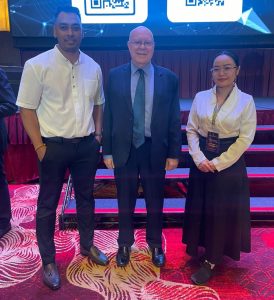The Malaysia Agreement 1963 stands as one of the most significant documents in the nation’s constitutional history, shaping the formation, identity and governance of Malaysia for more than six decades. This importance was brought into focus during the International Legal Talk Series held on 7 October 2025 at the Imperial Hotel, Kuching, where students from the Bachelor of Laws (LLB) programme at SEGi College Sarawak gained a deeper understanding of MA63 as both a legal instrument and a living legacy.
Accompanied by lecturers Mr Sathiswaran Sathiasegaran and Ms Flora Santi Tahil, the students were guided through the historical and constitutional dimensions of MA63 by distinguished speakers who shared insights drawn from practice, policy and scholarship.
Delivering the keynote address, Datuk Sharifah Hasidah Aman Ghazali, Deputy Minister in the Sarawak Premier’s Department for Law, emphasised that MA63 should never be viewed as a mere historical reference. She described it as the cornerstone of Malaysia’s formation and an enduring commitment that ensures equal partnership between the founding regions. She reiterated that the federation was built on respect, autonomy and shared responsibility, rather than dominance or hierarchy.
Datuk Sharifah also highlighted recent constitutional amendments, including changes to Article 1 and Article 160, which reaffirm the distinct status of Sarawak and Sabah within Malaysia’s federal structure. These developments demonstrated how MA63 continues to influence national policy and legal interpretation.
The event was attended by several senior figures from state legal and administrative institutions, reflecting the importance of MA63 in shaping contemporary governance. Their presence underscored how the Agreement remains central to discussions on rights, representation, autonomy and federal balance.
Adding depth to the discourse were sessions by renowned legal scholars Professor Michael Leigh and Professor Andrew Harding. Professor Leigh traced the origins of MA63 through the Cobbold Commission Report and the Inter-Governmental Committee Report, explaining how these documents established the basis for Sarawak’s autonomy in matters such as immigration, language, religion, land and natural resources. He also shared historical perspectives on the formation of Malaysia, including the geopolitical challenges faced during the early 1960s.
Professor Harding presented a constitutional analysis of Malaysia’s federal system, describing its evolution and centralised tendencies. He explained that MA63 offers a framework for restoring balanced federalism and emphasised the importance of devolving meaningful powers to the states. He used the ongoing discourse on oil and gas rights as an example of how constitutional interpretation continues to shape the relationship between federal and state authorities.
For the Bachelor of Laws (LLB) students, the session transformed a familiar chapter of legal study into an active conversation about identity, governance and constitutional responsibility. It allowed them to see how historical agreements continue to influence modern law and policymaking, and why understanding MA63 is essential for anyone aspiring to contribute to Malaysia’s legal and civic landscape.
The experience enriched their academic journey by linking theory with contemporary issues. It also reinforced the importance of analytical thinking, historical awareness and constitutional literacy in shaping future legal professionals.
This event supports the following United Nations Sustainable Development Goals:
SDG 4 Quality Education
SDG 10 Reduced Inequalities
SDG 16 Peace, Justice and Strong Institutions




